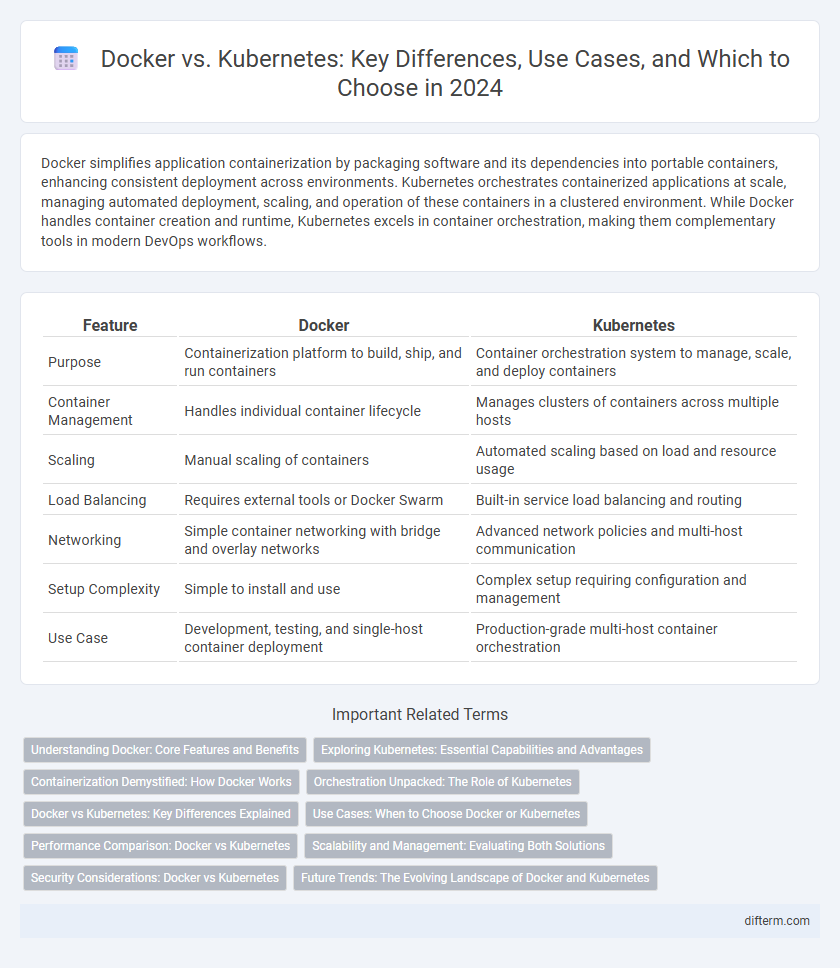Docker simplifies application containerization by packaging software and its dependencies into portable containers, enhancing consistent deployment across environments. Kubernetes orchestrates containerized applications at scale, managing automated deployment, scaling, and operation of these containers in a clustered environment. While Docker handles container creation and runtime, Kubernetes excels in container orchestration, making them complementary tools in modern DevOps workflows.
Table of Comparison
| Feature | Docker | Kubernetes |
|---|---|---|
| Purpose | Containerization platform to build, ship, and run containers | Container orchestration system to manage, scale, and deploy containers |
| Container Management | Handles individual container lifecycle | Manages clusters of containers across multiple hosts |
| Scaling | Manual scaling of containers | Automated scaling based on load and resource usage |
| Load Balancing | Requires external tools or Docker Swarm | Built-in service load balancing and routing |
| Networking | Simple container networking with bridge and overlay networks | Advanced network policies and multi-host communication |
| Setup Complexity | Simple to install and use | Complex setup requiring configuration and management |
| Use Case | Development, testing, and single-host container deployment | Production-grade multi-host container orchestration |
Understanding Docker: Core Features and Benefits
Docker simplifies application deployment through containerization, enabling developers to package software with all its dependencies into portable containers. It offers lightweight, consistent environments that enhance scalability and speed up development cycles by eliminating environment discrepancies. Key features include image versioning, container orchestration capabilities through Docker Swarm, and seamless integration with CI/CD pipelines for automated workflows.
Exploring Kubernetes: Essential Capabilities and Advantages
Kubernetes excels in automating container orchestration, providing robust scaling, self-healing, and load balancing capabilities for complex applications. Its declarative configuration and extensive ecosystem enable seamless management of large-scale, distributed systems, outperforming Docker's simpler container management. Kubernetes' advanced networking and storage solutions enhance application resilience and operational efficiency in cloud-native environments.
Containerization Demystified: How Docker Works
Docker leverages containerization technology to bundle applications and their dependencies into lightweight, portable containers, ensuring consistent runtime environments across different systems. It uses container images built from layered filesystems which allow efficient storage and version control, while Docker Engine manages container creation and execution through OS-level virtualization. By isolating applications within containers, Docker simplifies deployment, scalability, and resource management compared to traditional virtual machines.
Orchestration Unpacked: The Role of Kubernetes
Kubernetes is the leading container orchestration platform, automating deployment, scaling, and management of containerized applications across clusters of hosts. Unlike Docker's native orchestration tool, Docker Swarm, Kubernetes offers extensive features such as self-healing, load balancing, and secret management, enabling robust and scalable cloud-native infrastructure. Enterprises leverage Kubernetes to streamline continuous integration and continuous delivery (CI/CD) pipelines, enhancing operational efficiency and infrastructure reliability.
Docker vs Kubernetes: Key Differences Explained
Docker and Kubernetes serve distinct but complementary roles in containerization, with Docker primarily focusing on container creation and packaging, while Kubernetes excels in container orchestration and management across clusters. Docker simplifies application deployment by providing container runtime and image management, whereas Kubernetes automates deployment, scaling, and operations of containerized applications in complex environments. Understanding these key differences helps organizations leverage Docker for development efficiency and Kubernetes for handling large-scale, distributed systems.
Use Cases: When to Choose Docker or Kubernetes
Docker excels in containerizing applications for individual developers or small teams needing rapid deployment and isolated environments, ideal for local development and simple microservices. Kubernetes is suited for managing complex, large-scale cluster environments requiring automated orchestration, scalability, and high availability across distributed systems. Choose Docker for straightforward container management and Kubernetes for advanced multi-container orchestration and enterprise-grade infrastructure.
Performance Comparison: Docker vs Kubernetes
Docker excels in containerization by providing lightweight, fast, and efficient environment deployment, making it ideal for single-container performance optimization. Kubernetes, designed for orchestration, manages complex multi-container applications across clusters but introduces some overhead due to its scheduling and resource management layers. Performance benchmarks indicate Docker outperforms Kubernetes in startup time and resource consumption, while Kubernetes offers superior scalability and fault tolerance for large-scale, distributed systems.
Scalability and Management: Evaluating Both Solutions
Docker provides a straightforward containerization platform with native tools like Docker Swarm for basic scalability and orchestration, suitable for smaller-scale applications. Kubernetes offers advanced scalability and management features, including automatic load balancing, self-healing, and extensive multi-node orchestration capabilities, making it ideal for complex, distributed systems. Enterprises prioritizing robust scalability and granular control often prefer Kubernetes for large-scale deployments due to its comprehensive ecosystem and extensive community support.
Security Considerations: Docker vs Kubernetes
Docker and Kubernetes both provide robust container security features, but Kubernetes offers advanced mechanisms like role-based access control (RBAC), network policies, and secrets management that enhance cluster-wide security. Docker focuses on container isolation and image scanning to detect vulnerabilities before deployment, while Kubernetes integrates with external security tools to ensure runtime protection and compliance. Evaluating security in container orchestration requires considering Kubernetes' ability to enforce fine-grained access controls and secure multi-tenant environments compared to Docker's more straightforward, single-node security model.
Future Trends: The Evolving Landscape of Docker and Kubernetes
Docker and Kubernetes continue to dominate containerization and orchestration, with Kubernetes gaining traction due to its advanced scalability and multi-cloud capabilities. Future trends indicate a growing integration of AI and machine learning for automated container management and resource optimization. Enhanced security features and serverless architecture support will further shape the evolving landscape of Docker and Kubernetes platforms.
Docker vs Kubernetes Infographic

 difterm.com
difterm.com